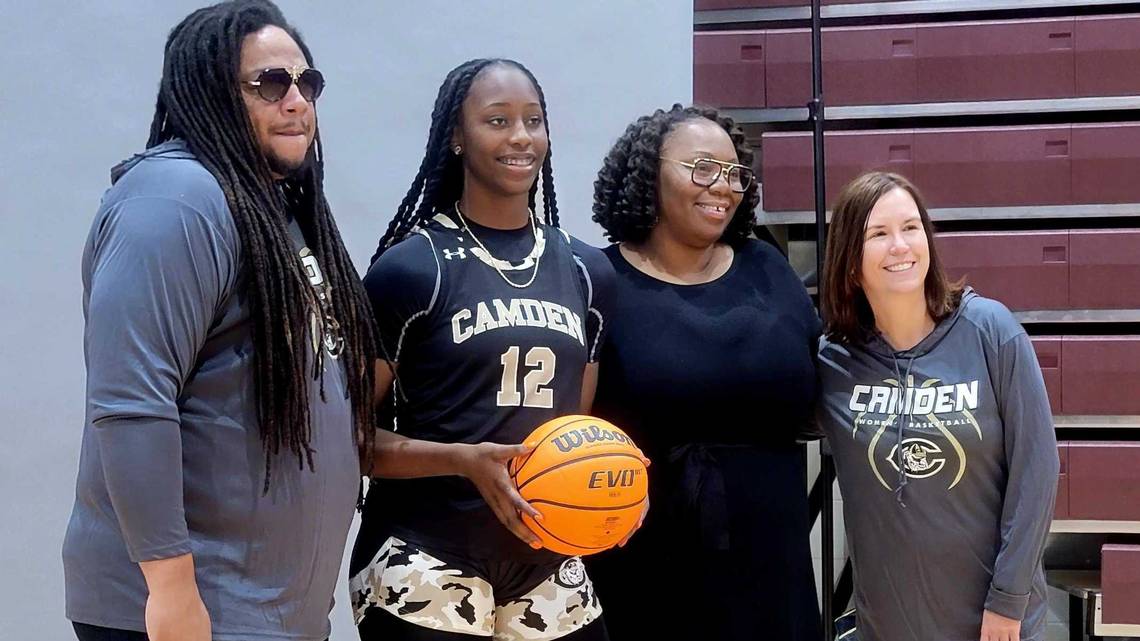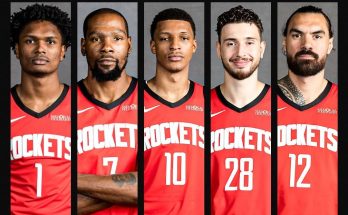Dawn Staley’s admiration for Joyce Edwards following Team USA’s triumphant gold medal win was both heartfelt and emphatic. In the aftermath of a hard-fought competition that showcased the pinnacle of women’s basketball talent on the global stage, Staley’s words carried the weight of experience, respect, and genuine pride. To say Edwards “played her Gamecock butt off” was more than just a colloquial compliment—it was a testament to Edwards’ relentless commitment, her fierce competitive spirit, and the indelible mark she left on Team USA’s path to dominance.
The gold medal game, a culmination of years of preparation, practice, and sacrifice, was a spectacle where every player had a role to play, every moment demanded intensity, and every possession mattered. Edwards, known for her tenacity and precision, emerged as one of the most vital contributors. She did not simply participate; she owned her moments on the court with the kind of determination that coaches dream of and teammates rally behind. Staley, who has long been revered as one of the greatest minds and leaders in women’s basketball, was not just impressed by Edwards’ statistics or highlight-reel plays. She saw something far deeper—a fierce competitor who embodied the spirit of the Gamecock legacy and brought that fire to the international stage.
Staley’s praise underscores the significance of Edwards’ journey. Coming from the University of South Carolina, where the Gamecocks have established themselves as a powerhouse in women’s college basketball, Edwards carried with her the ethos of grit, discipline, and unyielding effort. The Gamecock program, under Staley’s leadership, has been a breeding ground for champions—not just in terms of winning titles but in shaping character and forging leaders. Edwards epitomized that culture in every second she spent representing Team USA, seamlessly blending her collegiate experience with the elevated demands of international competition.
During the tournament, Edwards was a beacon of consistency. Whether it was stepping up in crucial defensive assignments, making clutch shots, or energizing the team with her infectious enthusiasm, she was a reliable force that opponents struggled to contain. Her ability to read the game, anticipate plays, and execute under pressure was a result of years of honing her skills against some of the toughest competition in the NCAA. But more than that, it was her heart—her willingness to leave everything on the court—that truly distinguished her performance.
Staley, in reflecting on Edwards’ contributions, highlighted how the guard’s energy and passion were contagious. It wasn’t just about individual accolades; Edwards played with a team-first mentality that galvanized her teammates. Her relentless hustle on both ends of the floor created momentum swings that lifted Team USA when it mattered most. The kind of player who dives for loose balls, contests every shot, and pushes the pace with confidence, Edwards embodied the essence of a championship-caliber athlete. Staley’s words, then, serve as a tribute not just to Edwards’ skill but to the intangible qualities that define greatness—resilience, leadership, and an unshakeable competitive spirit.
One of the defining moments that Staley likely had in mind was Edwards’ ability to rise to the occasion in tight moments. In international basketball, where the margin for error is razor-thin and the stakes are monumental, mental toughness is as critical as physical talent. Edwards demonstrated this repeatedly, making the kind of plays that shift the narrative of a game and inspire teammates to elevate their own performances. Her poise in the face of pressure and her unwavering focus were reflections of the intense preparation and mental conditioning that Staley instills in her players.
Beyond the game itself, Edwards’ impact extended to the locker room and the broader Team USA culture. Staley has often emphasized the importance of chemistry and mutual respect in building a championship team. Edwards, with her humble demeanor and relentless work ethic, embodied these values and contributed to an environment where every player felt valued and motivated. She was a leader by example, showing younger teammates how to balance confidence with humility and how to channel passion into productive, disciplined play. This holistic contribution is what made Edwards indispensable to Team USA’s success and why Staley’s praise resonated so deeply.
Staley’s acknowledgment also serves as a reminder of the legacy and future of women’s basketball. Players like Edwards, who have risen through the ranks of collegiate basketball to achieve global success, represent the evolving narrative of the sport—one where talent is nurtured, leadership is cultivated, and opportunities are expanding. Edwards’ gold medal is not just a personal triumph; it symbolizes the collective progress of women’s basketball and the growing recognition of female athletes on the world stage. Staley’s pride in Edwards is intertwined with her broader vision for the sport, one that champions excellence, equality, and empowerment.
Moreover, the phrase “played her Gamecock butt off” encapsulates a certain authenticity and affection that transcends formal accolades. It speaks to the camaraderie and shared history between coach and player, between program and individual. It’s a nod to the countless hours of drills, the early morning workouts, the moments of doubt overcome by sheer determination. It’s a celebration of the Gamecock identity—tough, relentless, and fiercely proud. For Staley, who has been a mentor and guiding force for Edwards, these words carry the warmth of personal connection and professional admiration.
In the broader context of Team USA’s dominance, Edwards’ role was integral. The team’s success was the product of collective effort, strategic brilliance, and individual excellence. Edwards was a critical piece in this puzzle, blending her skills with those of her teammates to create a formidable unit. Her defensive tenacity disrupted opponents’ best plays, her offensive contributions provided crucial scoring bursts, and her leadership helped maintain composure in high-pressure scenarios. Staley’s praise reflects an understanding that championships are won not just by stars but by players who embrace every role with passion and precision—and Edwards did just that.
The gold medal itself is a symbol of achievement, but Staley’s words give it a richer meaning. They celebrate the journey—the sacrifices made, the challenges overcome, and the unwavering commitment to a shared goal. Edwards’ performance on the Olympic stage was the culmination of a dream nurtured through years of hard work, and Staley’s recognition immortalizes that effort. It is a moment of triumph that acknowledges both individual brilliance and the power of team spirit.
Reflecting on Edwards’ journey also highlights the importance of representation and inspiration. Young athletes watching the gold medal game witnessed a player who exemplifies dedication, resilience, and passion. Edwards’ story, amplified by Staley’s praise, becomes a beacon for aspiring basketball players everywhere, particularly young women who see in her a pathway to greatness. It underscores the message that with the right combination of talent, hard work, and guidance, reaching the highest levels of sport is possible.
In sum, Dawn Staley’s praise of Joyce Edwards after Team USA’s gold medal win is a multifaceted tribute. It honors Edwards’ skill, her heart, and her embodiment of the Gamecock spirit. It recognizes her impact on the court and in the team dynamic. It celebrates the legacy of a coach-player relationship rooted in mutual respect and shared ambition. And it enshrines Edwards as a role model for the next generation of athletes. Staley’s words, simple yet profound, capture the essence of what it means to play with passion, pride, and purpose—a fitting homage to a player who truly played her “Gamecock butt off” for the glory of Team USA.



